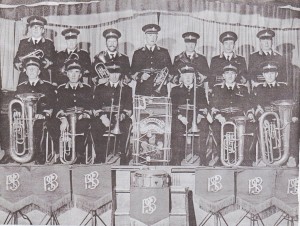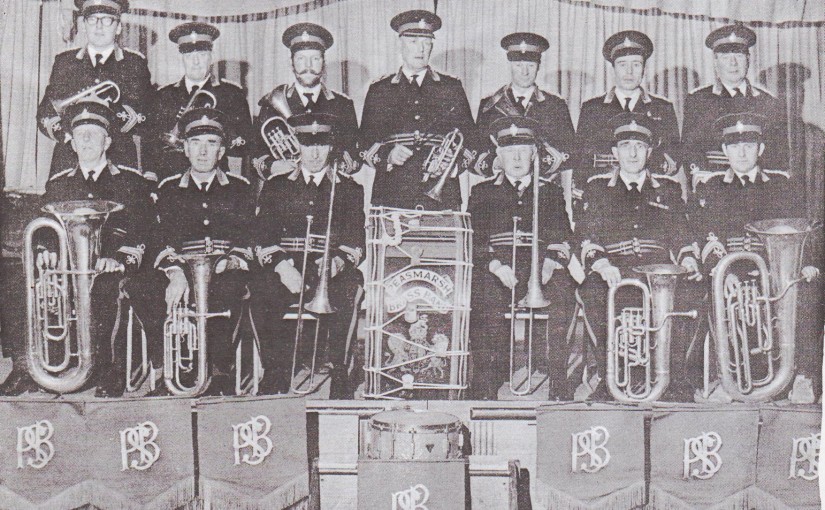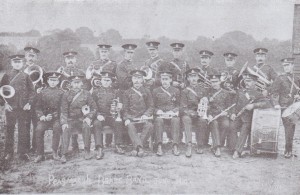This is the Simple Memory of a Village Band written by the Bass Drummer
In 1902, Percy Daw, a young Peasmarsh man, who came from a musical family. decided to form a band. With the help of his friend, Ernest Offen, who was also very musical, he recruited a number of lads who were interested and Peasmarsh Brass Band was born.
Most of the early members were farm workers. With a little money the.y raised among themselves and help from the villagers, instruments were purchased.
They learnt to play with the help of Percy and Ernest and their own perseverance.
The noise of individuals playing at home annoyed some and pleased others. The Band practised together in an oast house, but at certain times of the year it was in use so new premises were sought. By the kindness of Mr. Charles Clarke, they were granted the use of part of his stable at the Cock Inn. The rats got a bit scared, but the pony soon got used to it, and received many a sugar lump for being so amiable towards the Band and tolerant to the weird noises that issued forth at this early stage.
In 1914 when the War started there were enough men exempt from Military service to keep the Peasmarsh Band together. When the lads who were spared came home in 1918, they rejoined and swelled the ranks.
Peasmarsh Brass Band June 1910
Members include:— Jim Butler, “Jummy” CLarke, Harry Wells, Alf Brann, George Daw, Burt Field, Charlie Ashdown, Larry Standen, Harry Dengate, George Ashdown, Ned Ashdownn and Ernest Offen.
The Band
By Alfred Padgham
I joined the Band in 1921 and carried the bass drum until 1960. The bass drummer gives the beat for the marchers. and they take their pace from him, it didn’t always go without a hitch. We went to a fête once at Sandhurst in Kent. After falling in at the Swan Inn we headed a procession of children in fancy dress to the field where the fete was to be held. With children all sizes, some tiny tots, how could I give them any sort of a step with the drum? So when we got too far ahead, we stopped and waited for them. On arrival at the field, we discovered the first item on the programme was a maypole dance. The poor band chaps had hardly got their breath from the march and had to blow and blow until their faces were red. But tea for the band was the next item, which put all concerned into a good humour.
Readers may wonder how the band travelled to the various functions. In the early days, it was nothing for the men to walk. One man in the village had two cobs and a waggonnette and thisthey hired to take the bass drum, music stands and large instruments. After the First World War, Ernest Offen started a carriers business to and from Rye. He had a Ford tilted lorry, which was licensed to carry passengers. It was allowed 18 men with the driver, but many tines her strength was taxed, and a little help was needed up a bad hill. I can hear them now:
‘Come on lads, shove!’
Not just the band, but many cricketers, footballers and dancers were conveyed by Uncle Em and his lorry. Nothing was too much trouble for him. He would get them there, if not always on time.
Village Blowhards
The band was quite good in the thirties, and had a fair share of engagements in the surrounding villages. The band showed itself off at Church parades and performed the hymns in Church. It made one proud to belong to the ‘Village Blowhards’ as we were sometimes called.
It started out as Peasmarsh Brass Band, but with the war and men getting around and learning and with the clarinets in the Band, this name would not do. It ought to be Peasmarsh Military Band. They worked hard, took as many flower show jobs as they could to raise cash for new uniforms and silver instruments, so finally it had to be Peasmarsh Silver Band.

Peasmarsh Silver Band
Peasmarsh Silver Band 1960 Photo by A. Vaughan Kimber
Standing L. to R : G. Hammond, A. Paine, C. Piggott, A. Murreii, A. Brotherwood, D. Cope, E. Sims. Sitting L. to R. : F. Crisford, L. Ovenden, C. Bridger, G. Daw, D. Wells, D. Sellman.
When it comes to a Church Parade, you must have the step presentable, but one elderly member of the Legion always used to say, ‘Don’t forget the old ‘uns Padgham’
In 1959, I decided that the drum had got too heavy for me to carry, especially to Peasmarsh Church, between Peasmarsh Place and the Church. It was open to the wind there, and with a strong wind blowing from the South West, it almost blew me over.
At one of the last Church Parades attended by the band, after I had to give up, Albert Paine had the drum. They used to call him Jumbo. As they marched, he started to beat a bit quicker and quicker still. Alec Murrell, the bandmaster kept trying to wave him down, but Albert couldn’ t get to the Church soon enough.
They made it to the church, blowing and puffing, and Alec’s first words were ‘What the hell went wrong with you Jumbo?’, Albert replied in his excellent Sussex accent;
‘Well, my tie pin came undone, and lodged between me and the drum. I didn’ t want to stop the band, but every beat the pin was pricking me’
The band has broken up now. and my grandson John, has the drum as a keepsake. My wife and I live with his parents in Berkshire, but we go back to Peasmarsh for holidays. The drum must be nigh on 70 years old now, and John being 21 can still tell its story in 50 year’s time, with something antique to show. I hope this generation will be reminded of the hours spent by those working men of Peasmarsh, and remember that they gave people much pleasure.
Rye’s Own April 1972
All articles, photographs and drawings on this web site are World Copyright Protected. No reproduction for publication without prior arrangement. © World Copyright 2015 Cinque Ports Magazines Rye Ltd., Guinea Hall Lodge Sellindge TN25 6EG

